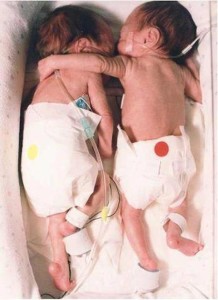On October 17th 1995, identical twins were born 12 weeks prematurely in Massachusetts. The older of the twins was stable, but the younger was deteriorating despite all the medical care given to her. A couple of weeks later, she still had abnormal heart rate, body temperature and colour—and it seemed as though she would not make it. A nurse on duty asked the parents if she could put the two babies together in the same incubator. As soon as they touched, the thriving sibling put an arm around her ailing sister. The effect was immediate; all the vital signs in the failing baby stabilised. They are now 18 years old. (It has become a widely accepted practice to co-bed multiple births in NICU).
One of the things that always saddened me as a GP was how often I saw older people in our community who were so lonely and socially isolated. Even those with family and friends often spoke of everyone being so busy and not having time for contact. For quite a number, their visit to the doctor and the local shops were the only source of social interaction in their week.
In medicine we see patients survive and thrive even in critical conditions when they have strong social support. We also see the opposite where patients with minor diagnoses decline when they do not have a social network of care. It confounds us as doctors, making no medical sense. Yet there are deeper and more complex issues at play here—issues of connectedness, emotion, of one’s place in the world, which we do not fully comprehend.
Everyone is looking for connection. This is the thread of life. This is what brings well-being to the mind, body and spirit: spending time with someone, giving them a hug, affirming them. Deliberate kindnesses are powerful acts of love for both the receiver and the bestower.
Are you able to give and receive this love each day? Not just doing things as a habit, with no conscious awareness, but with intention so that you experience that warm glow viscerally. This can be with family and friends, in the workplace or even a random exchange of good will with a complete stranger. Make a commitment to yourself to experience this feeling in the engagements through your day.
Dr Albert Schweitzer (winner of the Nobel Peace Prize in 1952) said “Sometimes our light goes out but is blown again into flame by an encounter with another human being. Each of us owes our deepest thanks to those who have rekindled this inner light.”






